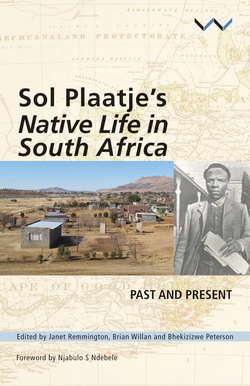Читать книгу Sol Plaatje's Native Life in South Africa - Jacob Dlamini - Страница 8
На сайте Литреса книга снята с продажи.
Sol Plaatje (1876–1932) – formative years
ОглавлениеSolomon (Sol) Tshekisho Plaatje was born in the Orange Free State in 1876. Both his parents were of Barolong origin, and Christians – Lutherans of the Berlin Missionary Society. His Dutch-sounding surname was evidently given to his grandfather by a Griqua landlord. Not long after he was born, his family moved to the Berlin mission at Pniel, near Barkly West, where he attended the mission school. Here he learned both Dutch and English, and went as far as the school could take him.
In spite of his abilities at school, he did not join the ranks of select missionary-educated peers in going on to secondary education, but moved instead to the nearby diamond-mining town of Kimberley to take up a job as a telegraph messenger with the Post Office. He studied assiduously in his spare time, keen to qualify for employment as a court interpreter for the Cape's civil service, one of the sought-after jobs available to educated young black men like himself. At the same time he engaged in the busy social life that Kimberley's African community created for themselves, taking advantage of the relatively liberal atmosphere that prevailed in the town.
Early in 1898, aged twenty-one, he married Elizabeth M'belle, the sister of one of his closest friends, Isaiah Bud-M'belle, interpreter to the Griqualand West High Court. They were of Mfengu origin, isiXhosa speakers from the eastern Cape, and initially both families were opposed to the match. Later that year he secured the kind of job he was after, moving to Mafeking (later Mafikeng, now Mahikeng), some 200 miles to the north, to become clerk and interpreter to the magistrate and civil commissioner, Charles Bell. He was there when, in October 1899, war broke out between Britain and the Boer republics, and the town of Mafeking was immediately surrounded by Boer forces. He survived the ensuing seven-month siege, working throughout this time for both Charles Bell and the British military authorities, to whom he supplied military intelligence, collected from spies and runners who passed through the Boer lines. He also acted as interpreter to the Court of Summary Jurisdiction, set up after martial law was declared. Along with a number of others in Mafeking, many of them with little to do but await their relief, he wrote a personal diary – in English – persisting with it until the end of March 1900. Remarkably, the diary survived and was published for the first time in 1973.8 Two years later Plaatje left the Cape Civil Service in order to become editor of Koranta ea Becoana (Bechuana Gazette), an English-Setswana weekly newspaper that was financed by Silas Molema, a prominent Barolong chief in Mafeking. Although its finances were always precarious, it provided Plaatje with a platform to act as a spokesperson for his people – not only the Barolong but Setswana-speakers more generally, and for a wider constituency that extended beyond, encompassing Africans living in the Transvaal and the then Orange River Colony.
Koranta ea Becoana folded in 1909 but the following year, shortly after the Act of Union brought together the four colonies of southern Africa into a single new polity, he became editor of a new newspaper, Tsala ea Becoana (Friend of the Bechuana), which later expanded to become Tsala ea Batho (Friend of the People). He moved to Kimberley and was now supported financially by a Barolong consortium from Thaba 'Nchu anxious to make their voice heard in the affairs of the new Union of South Africa. Plaatje was recognised as one of the leading black spokespersons of his day, and was among those who came together in January 1912 to form the SANNC. He became its first general secretary and immediately set about arranging meetings with government ministers to lay their grievances before them.
